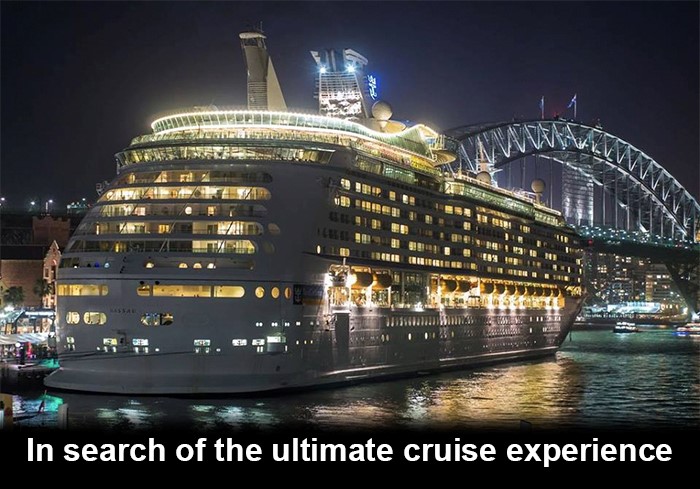New dimensions in vacations: Rethinking the cruise
Fourteen cool ideas for an awesome shipboard experience
Thomas Frey //April 27, 2016//


New dimensions in vacations: Rethinking the cruise
Fourteen cool ideas for an awesome shipboard experience
Thomas Frey //April 27, 2016//
Whenever I mention something about lack of cell service or bad Internet on a cruise ship, my wife, Deb, always responds by telling me that I’m supposed to be on vacation and I shouldn’t be thinking about work.
While I understand the need for “braincations,” and no, being off the grid is not going to kill me, I also know that most of the world is not wired that way. In fact, the entire cruise industry has been slow to capitalize on the massive market for working vacationers; a market that constitutes the vast majority of today’s leisure crowd.
It’s also an enormous adjustment for hyper-connected families to step onboard and readjust their thinking to work with such primitive communication tools. On ships carrying 2,000+ passengers it’s easy to lose a family member or friend several times a day.
Better communication systems will also shift the market away from the 70-year-old floating-assisted-living model to more active Gen-X and Gen-Y crowds. To this end, many cruise lines have already begun the process of equipping their ships with high bandwidth communication systems.
Why is the Internet so Expensive on a Cruise Ship?
Generating a reliable satellite signal to a moving ship is no small task. Not only do cruise lines have to lock on to a constantly moving signal in some of the most remote corners on earth, but they also need sufficient bandwidth to accommodate several thousand passengers at once.
Many already have already begun the Wi-Fi upgrade process while others will be installing new equipment later this year. Here are three examples:
- Royal Caribbean provides high-speed Internet on all of its 25 ships for $20 per day. They also offer a service called VOOM, which allows guests to stream videos and music for an extra $15 a day.
- Norwegian Cruise Line has also expanded Internet on all 13 of its ships for $29.99 a day, but there’s a catch. The Wi-Fi plan must be purchased for the entire trip, which means Wi-Fi will cost $300 for a 10-day cruise.
- All of Viking River Cruises' ships offer complimentary Wi-Fi. Access to a faster service – which is needed for video streaming – is available for $11.95 a day.
New Dimensions for Tomorrow’s Cruise Experience
Each level of bandwidth improvement comes with a vast new learning curve, one that will require several years to rethink service options.
The lack of wifi has also created a generational market gap with Gen-X and Millennials less inclined to spend a week or two without Internet.
Yes, cruise ships do offer luxury-class service, food, and entertainment. Some of the newer features like water slides, robotic bartenders, climbing walls, Jumbotron movies under the stars and indoor ice arenas all have they appeal, but as with all high-dollar experiences, next-generation customers are eager for something new.
Diverse communities create diverse interests and younger people are less interested in old school relaxation and far more interested in being engaged, learning new skills, and adding some new dimension to their lives.
With that in mind, here are 14 new features, made possible by better connectivity that could easily be added to cruise ships over the coming years:
Makerspaces – Equipped with laser cutters, welders, 3D printers, potters wheels, and jewelry making equipment, a well-furnished makerspace has the potential to radically transform the onboard experience. How-to classes can teach people the fundamentals of using specific pieces of equipment as well as making thinks they can show to their friends.
Videographer Studios – With smartphones replacing the need for elaborate cameras and editing skills, virtually every passenger has the need to improve their videographer skills. Keep in mind, video posted on social media have the potential to radically amp up the marketing reach of the personal cruise experience.
Video Game Tournament Centers – A 2015 study showed that 42 percentof Americans play video games at least three hours a week with the average age being 35 years old. Not only is it important to have the bandwidth to play online video games, but having a dedicated facility for onboard tournaments will also ensure maximum engagement for a large percentage of today’s young people.
Hacker Spaces and Hacker Classes – Every person connected to the Internet has a different level of proficiency. The online skills needed to be proficient in even rudimentary aspects of the web like word processing, texting, and social media are constantly evolving. Hacker spaces can serve as both training centers and entry points for newbies as well as rich technical environments for more advanced users.
Make Your Own Beer, Wine and Spirits Distilleries – Micro-breweries, micro-distilleries, and winemaking are quickly becoming part of urban culture and having the facilities to both teach the skills and taste the end product can easily become an engaging feature of every new cruise ship.
“Quantified Self” Center for Personal Analysis – Our ability to accurately measure the inputs and outputs of the human body are increasing exponentially with every new sensor and wearable device added to everyday living. These devices, along with data analytics machines, can be leveraged to provide a hyper-individualized health analysis offering a range of plans for improvement.
New Product Expos – Companies are always seeking new ways to introduce a new line of products. Whether its food products, household gadgets, Internet of Things devices, software, hardware, or something else, people are continually fascinated by cutting edge products. This will open the doors for sponsorship arrangements with companies who otherwise have little connection to the cruise industry.
Floating Garden Centers – Rather than just looking at plants and flowers on a ship, many are interested in learning about the species and how to grow them at home. Ships are well positioned to become working laboratories for aquaponics and hydroponic operations, and a significant percentage of passengers would love to be engaged in this type of experience.
Drone Training Facilities – The emerging field of flying drones has captured the imagination of hobbyists and working professionals alike. Operating without the restrictions of defined airspace and country-to-country restrictions, ship-based drones can be used for entertainment, pilot training, photography, surveillance, remote lighting, drone rescue, and much more.
Cannabis Cooking Classes – In much the same way gambling is not legal while ships are docked, the open seas can open the doors to recreational marijuana in much the same ways Colorado and Washington are exploring today. This would open the door to cannabis cooking classes, new types of lounges, alternative health courses, and much more.
Escape Rooms – One of the fastest growing teambuilding exercises and family entertainment are escape rooms and the intricate layers of puzzle pieces and clues teams need to filter through to find a way out. Based on the notion of living through a real life video game experience, participants find themselves challenged in new and exciting ways.
Treasure Hunts – The online world provides an entirely new dimension to treasure hunts with physical and virtual clues making the final destination all the more rewarding. Answers or clues can be hidden anywhere on the ship and real-time tracking can provide team members with instant feedback of their progress.
Onboard Competitions – With all the new possibilities, a natural extension of these activities will be to stage competitions to uncover the best of the best. Contests can range from drone races, to building makerspace jewelry boxes, wine tasting, beer tasting, best short videos, ship-to-ship video game competitions, and more.
Collaborative Work Spaces – For those who don’t have the luxury of being off-grid on their cruise, the quality of workspaces matter. Collaborative environments are natural conversation starters as well as fertile territory for discovering new friends and business contacts.

























